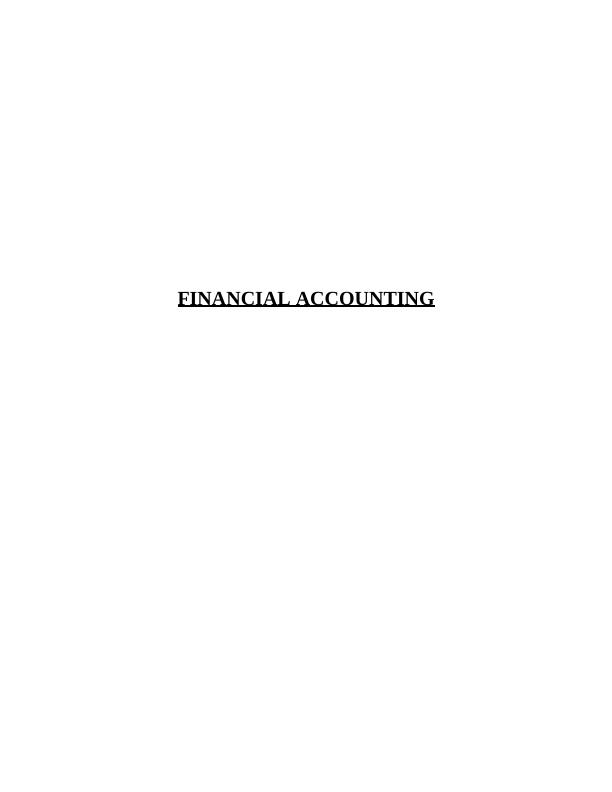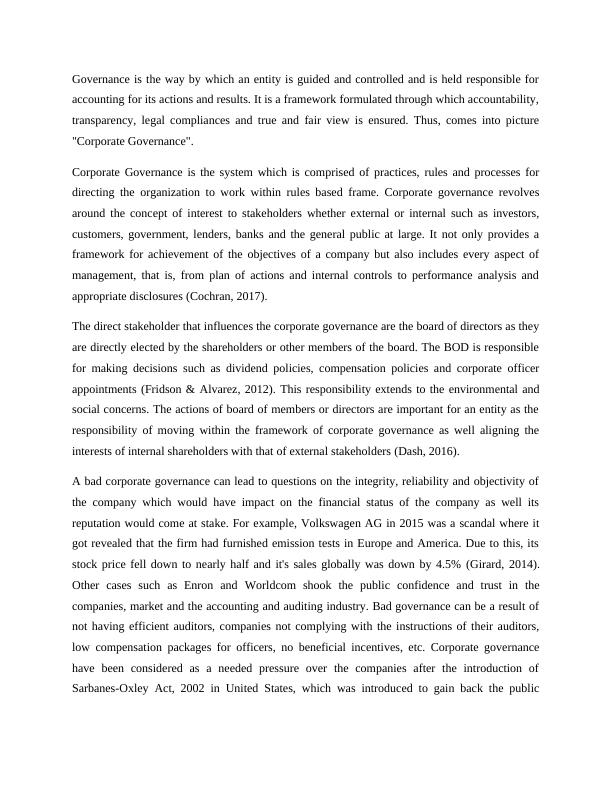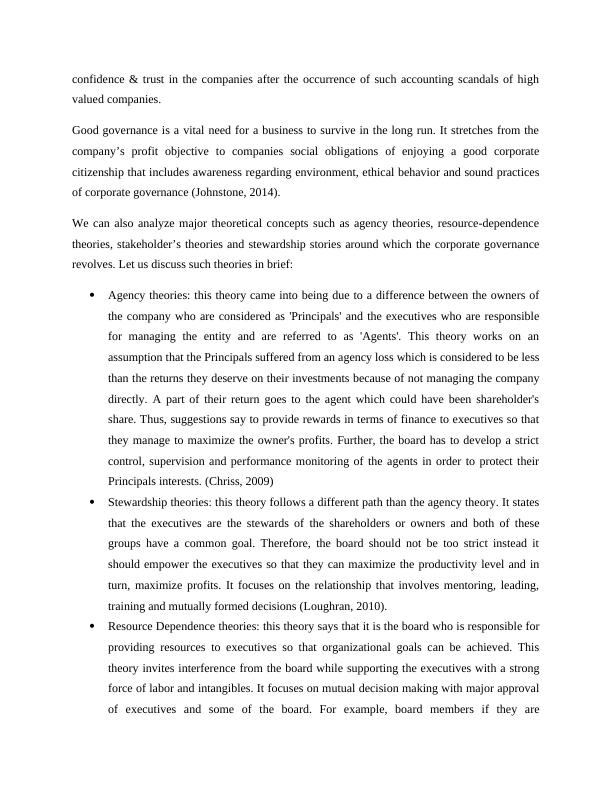Corporate Governance and Its Theoretical Concepts
Added on 2023-06-07
9 Pages2636 Words109 Views
FINANCIAL ACCOUNTING

Governance is the way by which an entity is guided and controlled and is held responsible for
accounting for its actions and results. It is a framework formulated through which accountability,
transparency, legal compliances and true and fair view is ensured. Thus, comes into picture
"Corporate Governance".
Corporate Governance is the system which is comprised of practices, rules and processes for
directing the organization to work within rules based frame. Corporate governance revolves
around the concept of interest to stakeholders whether external or internal such as investors,
customers, government, lenders, banks and the general public at large. It not only provides a
framework for achievement of the objectives of a company but also includes every aspect of
management, that is, from plan of actions and internal controls to performance analysis and
appropriate disclosures (Cochran, 2017).
The direct stakeholder that influences the corporate governance are the board of directors as they
are directly elected by the shareholders or other members of the board. The BOD is responsible
for making decisions such as dividend policies, compensation policies and corporate officer
appointments (Fridson & Alvarez, 2012). This responsibility extends to the environmental and
social concerns. The actions of board of members or directors are important for an entity as the
responsibility of moving within the framework of corporate governance as well aligning the
interests of internal shareholders with that of external stakeholders (Dash, 2016).
A bad corporate governance can lead to questions on the integrity, reliability and objectivity of
the company which would have impact on the financial status of the company as well its
reputation would come at stake. For example, Volkswagen AG in 2015 was a scandal where it
got revealed that the firm had furnished emission tests in Europe and America. Due to this, its
stock price fell down to nearly half and it's sales globally was down by 4.5% (Girard, 2014).
Other cases such as Enron and Worldcom shook the public confidence and trust in the
companies, market and the accounting and auditing industry. Bad governance can be a result of
not having efficient auditors, companies not complying with the instructions of their auditors,
low compensation packages for officers, no beneficial incentives, etc. Corporate governance
have been considered as a needed pressure over the companies after the introduction of
Sarbanes-Oxley Act, 2002 in United States, which was introduced to gain back the public
accounting for its actions and results. It is a framework formulated through which accountability,
transparency, legal compliances and true and fair view is ensured. Thus, comes into picture
"Corporate Governance".
Corporate Governance is the system which is comprised of practices, rules and processes for
directing the organization to work within rules based frame. Corporate governance revolves
around the concept of interest to stakeholders whether external or internal such as investors,
customers, government, lenders, banks and the general public at large. It not only provides a
framework for achievement of the objectives of a company but also includes every aspect of
management, that is, from plan of actions and internal controls to performance analysis and
appropriate disclosures (Cochran, 2017).
The direct stakeholder that influences the corporate governance are the board of directors as they
are directly elected by the shareholders or other members of the board. The BOD is responsible
for making decisions such as dividend policies, compensation policies and corporate officer
appointments (Fridson & Alvarez, 2012). This responsibility extends to the environmental and
social concerns. The actions of board of members or directors are important for an entity as the
responsibility of moving within the framework of corporate governance as well aligning the
interests of internal shareholders with that of external stakeholders (Dash, 2016).
A bad corporate governance can lead to questions on the integrity, reliability and objectivity of
the company which would have impact on the financial status of the company as well its
reputation would come at stake. For example, Volkswagen AG in 2015 was a scandal where it
got revealed that the firm had furnished emission tests in Europe and America. Due to this, its
stock price fell down to nearly half and it's sales globally was down by 4.5% (Girard, 2014).
Other cases such as Enron and Worldcom shook the public confidence and trust in the
companies, market and the accounting and auditing industry. Bad governance can be a result of
not having efficient auditors, companies not complying with the instructions of their auditors,
low compensation packages for officers, no beneficial incentives, etc. Corporate governance
have been considered as a needed pressure over the companies after the introduction of
Sarbanes-Oxley Act, 2002 in United States, which was introduced to gain back the public

confidence & trust in the companies after the occurrence of such accounting scandals of high
valued companies.
Good governance is a vital need for a business to survive in the long run. It stretches from the
company’s profit objective to companies social obligations of enjoying a good corporate
citizenship that includes awareness regarding environment, ethical behavior and sound practices
of corporate governance (Johnstone, 2014).
We can also analyze major theoretical concepts such as agency theories, resource-dependence
theories, stakeholder’s theories and stewardship stories around which the corporate governance
revolves. Let us discuss such theories in brief:
Agency theories: this theory came into being due to a difference between the owners of
the company who are considered as 'Principals' and the executives who are responsible
for managing the entity and are referred to as 'Agents'. This theory works on an
assumption that the Principals suffered from an agency loss which is considered to be less
than the returns they deserve on their investments because of not managing the company
directly. A part of their return goes to the agent which could have been shareholder's
share. Thus, suggestions say to provide rewards in terms of finance to executives so that
they manage to maximize the owner's profits. Further, the board has to develop a strict
control, supervision and performance monitoring of the agents in order to protect their
Principals interests. (Chriss, 2009)
Stewardship theories: this theory follows a different path than the agency theory. It states
that the executives are the stewards of the shareholders or owners and both of these
groups have a common goal. Therefore, the board should not be too strict instead it
should empower the executives so that they can maximize the productivity level and in
turn, maximize profits. It focuses on the relationship that involves mentoring, leading,
training and mutually formed decisions (Loughran, 2010).
Resource Dependence theories: this theory says that it is the board who is responsible for
providing resources to executives so that organizational goals can be achieved. This
theory invites interference from the board while supporting the executives with a strong
force of labor and intangibles. It focuses on mutual decision making with major approval
of executives and some of the board. For example, board members if they are
valued companies.
Good governance is a vital need for a business to survive in the long run. It stretches from the
company’s profit objective to companies social obligations of enjoying a good corporate
citizenship that includes awareness regarding environment, ethical behavior and sound practices
of corporate governance (Johnstone, 2014).
We can also analyze major theoretical concepts such as agency theories, resource-dependence
theories, stakeholder’s theories and stewardship stories around which the corporate governance
revolves. Let us discuss such theories in brief:
Agency theories: this theory came into being due to a difference between the owners of
the company who are considered as 'Principals' and the executives who are responsible
for managing the entity and are referred to as 'Agents'. This theory works on an
assumption that the Principals suffered from an agency loss which is considered to be less
than the returns they deserve on their investments because of not managing the company
directly. A part of their return goes to the agent which could have been shareholder's
share. Thus, suggestions say to provide rewards in terms of finance to executives so that
they manage to maximize the owner's profits. Further, the board has to develop a strict
control, supervision and performance monitoring of the agents in order to protect their
Principals interests. (Chriss, 2009)
Stewardship theories: this theory follows a different path than the agency theory. It states
that the executives are the stewards of the shareholders or owners and both of these
groups have a common goal. Therefore, the board should not be too strict instead it
should empower the executives so that they can maximize the productivity level and in
turn, maximize profits. It focuses on the relationship that involves mentoring, leading,
training and mutually formed decisions (Loughran, 2010).
Resource Dependence theories: this theory says that it is the board who is responsible for
providing resources to executives so that organizational goals can be achieved. This
theory invites interference from the board while supporting the executives with a strong
force of labor and intangibles. It focuses on mutual decision making with major approval
of executives and some of the board. For example, board members if they are

End of preview
Want to access all the pages? Upload your documents or become a member.
Related Documents
Corporate Governance of HSBC: Board Structure, Diversity, and Recommendationslg...
|8
|2330
|64
Corporate Governance | Essaylg...
|20
|6357
|23
Corporate Governance: Importance, Tools, and Lessons from Volkswagen Scandallg...
|6
|1862
|334
Implications of Corporate Collapses: A Case Study of Harris Scarfelg...
|9
|2490
|445
Volkswagen Scandallg...
|15
|3975
|23
Ethics and Governance in Propertylink Group Limitedlg...
|14
|4042
|98
